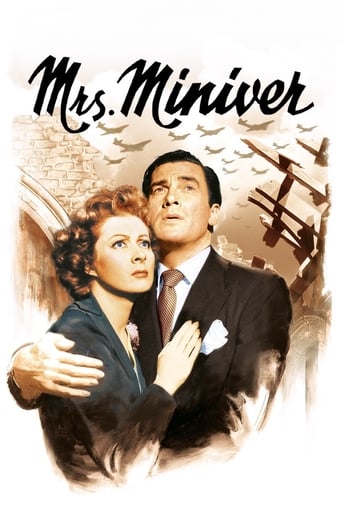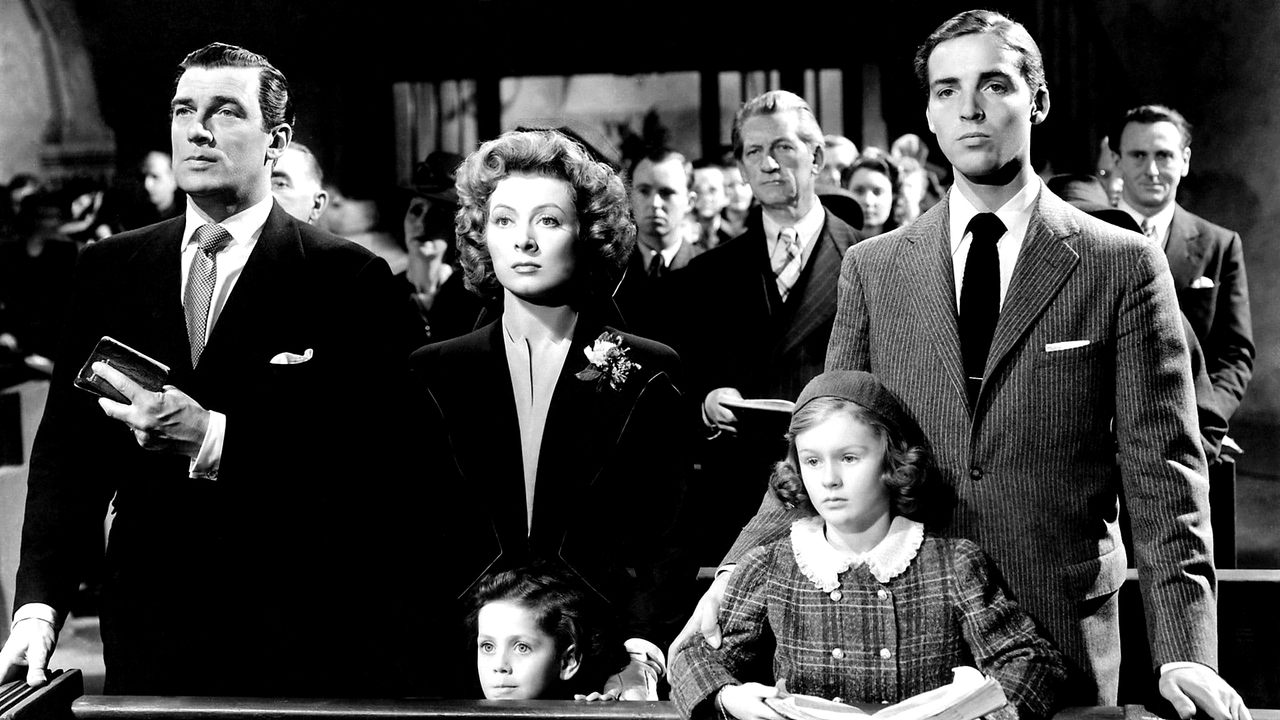JohnHowardReid
Copyright 15 May 1942 by Loew's Inc. Presented by Metro-Goldwyn-Mayer. New York opening at Radio City Music Hall: 4 June 1942. U.S. release: 13 May 1942. Australian release: 1 October 1942. Sydney release at the Liberty. 12,013 feet. 14 reels. 133½ minutes.SYNOPSIS: Well-to-do English family copes with the outbreak of war - son enlists in the air force, father helps evacuate Dunkirk, mother captures a German aviator.NOTES: Mrs Miniver was voted Best Film of 1942 in The Film Daily annual poll of newspaper critics. Bosley Crowther placed the film on his Ten Best. The National Board of Review voted it third (after In Which We Serve and One of Our Aircraft is Missing). Picturegoer placed it first.COMMENT: It would be foolish to deny that Mrs Miniver has its faults: Photographically, the film is too MGM glossy. Admittedly, it's attractive to look at, but the texture is far too bright, far too sunny, far too bathed in light for even the most beneficent English summer (let alone the autumn of 1939 and the spring of 1940 in which the events are supposed to take place). The Hollywood sets too are far from English in atmosphere, while the supporting players are also overmuch inclined to overact their local colors.Nor are the principals altogether perfect. Greer Garson plays Mrs Miniver with her usual slightly-too-sweet air of patiently indulgent patronage, aided by Walter Pidgeon's mechanically dull husband. Richard Ney overdoes the ingratiating boyishness (he was actually 27 - he and Miss Garson were married shortly after the film's release). But Teresa Wright is remarkably luminous as Carol and Dame May Whitty makes a spiritedly strong-minded aristocrat. Henry Travers, as always, is delightful while Henry Wilcoxon (after a typically weak-as-water beginning) emerges with amazing forcefulness as the vicar.It is fortunate that these last four players have such important roles. For it is their assured playing (under Wyler's sensitive direction) that contributes so much to the ultimate power of the film.Whatever its faults, few would deny that the plot structure of the screenplay is certainly unusual: After a very quiet if cozily frantic start with domestic trivia and touches of local humor (in which Alec Craig plays an unusually large if rather appealing part, and to which Charles Irwin contributes a welcomely amusing cameo), the movie accelerates into a drama packed with so much incident and action, it is hard to believe (on paper) that the climactic highlight is actually who wins the prize for best rose at the annual village flower show. Yet this is indeed the case. The writers, the director and the main participants (Whitty and Travers) bring it off so superbly well it is one of the highlights of the film, surpassing such other powerful scenes as the gathering of the flotilla of small craft for Dunkirk (a sequence which is hurt by the rather obvious use of miniatures), the terror of two air raids and the vicar's final message, "This is a peoples' war." Yes, the flower show is most adroitly introduced and built up, the characters and their conflict so believable, it is one of the great film moments of the forties.Ronald Millar (who co-authored the sequel) investigated how the original script came to be written and wrote an article on his researches for MGM's publicity department. I quote: "It started way back in 1939 with some short stories in The Times (London). These stories attracted a wide circle of readers and were ultimately published in book form. This little book was particularly successful in America. A copy fell into the hands of producer Sidney Franklin who fell in love with the Miniver family. Franklin wanted to make the picture as a tribute to the English people, but had no story, nothing to go on but the little book of sketches describing a few small incidents in the daily life of the Minivers. There was no novel, no overall story at all, simply a family. Franklin called in James Hilton and R.C. Sherriff to rough out a treatment. They were joined by Claudine West, Franklin's personal assistant, an English¬woman who had worked with him for 15 years. The outline that emerged was worked up into a finished screen-play by Arthur Wimperis and George Froeschel."
Sergeant_Tibbs
The first of William Wyler's trio of Best Picture winners, the other great, the other not quite for me, comes with a stigmatic label as he admits it's guilty of a focused agenda. Made to provoke an emotional urgency for the Americans to join the second World War, Mrs. Miniver does often feel like overt propaganda. However, the sentiment of its melodrama is no less emotionally valid, and it often has some creative ways to deliver it in its resulting poignant third act. It is that final stretch which makes the film as it otherwise suffers from its episodic structure that only makes it sporadically engaging during lightweight sequences. It's otherwise saved by the terrific performances from its Oscar winning pair Greer Garson and Teresa Right who outshine their sometimes overacting supporting cast with nuanced and compassionate performances. At least the photography and production is relatively exquisite despite the limitations of an industry yet to be completely radicalised by Orson Welles. Yes, it's melodrama, but it's good melodrama, and it's stayed in the hearts of those who saw it in the 40s. Deserving of Best Picture? Not quite, but they could do worse. It does feel like its wins were making a statement however.7/10
grantss
Superb World War 2 drama, and the 1943 Best Picture Oscar winner.Great depiction of the effects of WW2 on a family and community, what they have to go through and how they survive. Not at all sugar- coated: quite gritty and realistic. Conclusion is very stirring. Also covers social issues, especially the English class system, though this is not tackled in a very in-depth or very confrontational manner. Considering that this was made in 1942, it would have have been intended as a propaganda movie, but it doesn't come across at all as being jingoistic or overly nationalistic. It is a movie for all time.Greer Garson and Teresa Wright are excellent in the main female roles, and well-deserved their Best Actress and Best Supporting Actress Oscars, respectively. Both are stunningly beautiful too. Henry Travers and May Witty are great as Mr Ballard and Lady Beldon, respectively, and deserved their supporting actor/actress nominations.However, among these fantastic performances are two weak ones which reduce the quality of the movie somewhat, and make it less than perfect. What possessed the producers to cast two Americans (though Walter Pidgeon might be regarded as a Canadian) in the two main male roles is beyond me. Walter Pidgeon is supposed to be the quintessential English gentleman yet doesn't even try to sound it, sticking with his American accent. This and his wooden acting are quite off-putting. Somehow he then got an Oscar nomination too.Richard Ney, as Vincent Miniver, at least put on an English accent, but it comes across as too posh and snooty. Also off-putting.Couldn't they find two English actors?Overall, however, it is a timeless classic.
jpark4
I'm sorry, but I've always felt that this film is overrated. The story is good, as a propaganda piece, yet the acting and the production values leave much to be desired.To begin with, this is a very claustrophobic film, and feels very set-bound. It feels exactly as if it is taking place in a studio in Hollywood, and there is very little that feels English about it. I always feel very conscious that this is an American film about England made in America-even the Miniver house is much more American than English.The acting is stiff. One is very conscious that the two principal American actors, Teresa Wright and Richard Ney, are clearly not English, and even the English actors seem to be trying too hard. Greer Garson gives the best performance in the film, but her acting seems strained throughout. Walter Pidgeon has a hard time being convincingly English, though as a Canadian, he does a better job than the Americans. I can see how this would have won Best Picture of 1942; the field was fairly weak that year (although I think that "Talk of the Town" was a better film, or even "King's Row"), and with our recent entry into the war, the propaganda impact was enough to put it over.It's an okay film that loses more impact each passing year. It certainly is not timeless art, nor is it deserving of the gushing praise that it often gets.



 AD
AD



